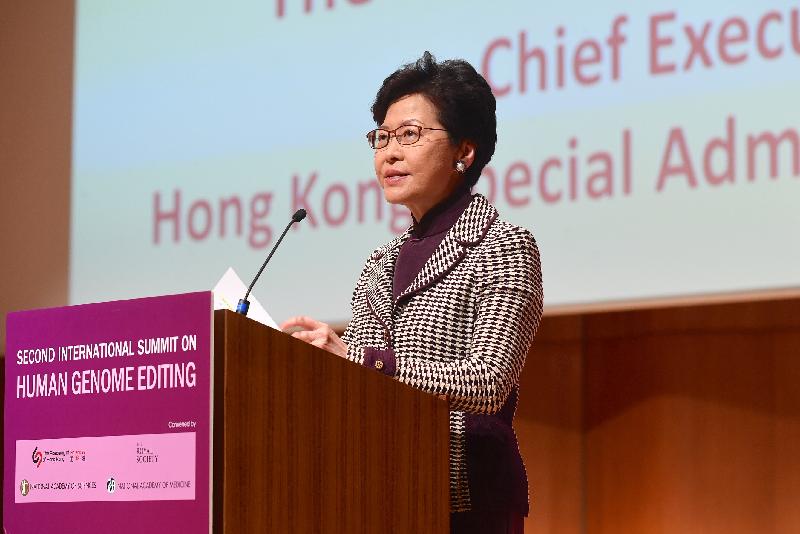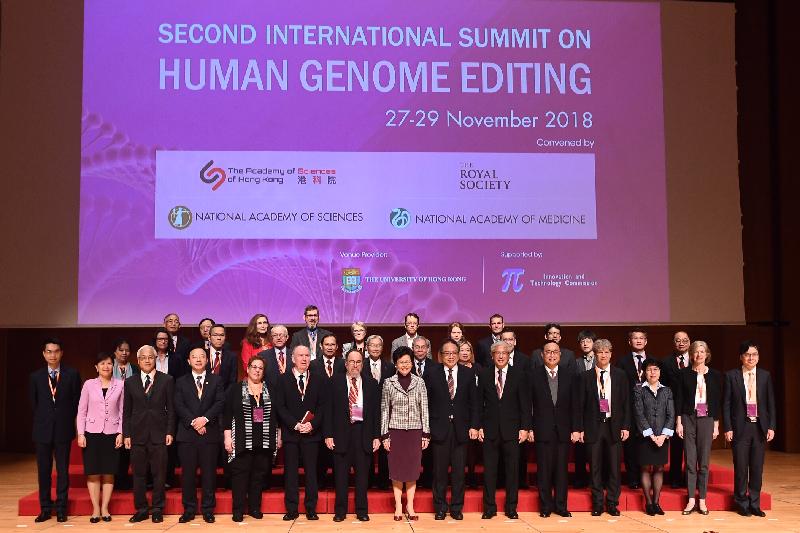Speech by CE at Second International Summit on Human Genome Editing (English only) (with photos/video)
******************************************************************************************
Professor Baltimore (Nobel laureate professor and Summit Organising Committee Chair, Professor David Baltimore), Professor Tsui (President of the Academy of Sciences of Hong Kong, Professor Tsui Lap-chee), Sir John (Vice President of the Royal Society, Sir John Skehel), Dr Dzau (President of the US National Academy of Medicine, Dr Victor Dzau), distinguished guests, ladies and gentlemen,
Good morning. Hong Kong is honoured to be chosen as the place for hosting a prestigious group of scientists and experts for the Second International Summit on Human Genome Editing, and I am pleased to welcome you all, especially those coming from the Mainland and overseas. I wish to thank, in particular, Victor Dzau, who first raised the idea of bringing this Summit to Hong Kong with me when we met in February this year. He said this Summit will no doubt put Hong Kong on the map of human genome editing and strengthen the Hong Kong Special Administrative Region Government's determination to press ahead with biomedical research in Hong Kong.
In 1990, hundreds of researchers from around the world joined forces for what became the world's largest biological project: determining the sequence of the human genome, identifying all the genes it contains. That landmark endeavour was declared complete in 2003, setting in motion extraordinary advances in the science of human genome editing. It also set in motion a great raft of concerns that led to the inaugural International Summit on Human Gene Editing in Washington, DC, three years ago.
If the technology has continued to accelerate since that 2015 Summit, so, too, have the concerns about the science, ethics, application and governance of human genome editing that must be addressed. This is I believe a subject that will be thoroughly deliberated during the course of this second Summit. Renowned scientists and researchers, technology experts and policymakers, ethicists, patient advocates and many others are here to connect with one another, to discuss and debate the potential benefits and risks of human genome editing, and to consider how to incorporate the societal views into regulations formulation and policy consideration.
Allow me to say, Hong Kong is an ideal place for holding this Summit, given our goal to become an international innovation and technology hub, an ambition with strong support from the Central Government. And biotechnology, I'm pleased to note, is among the key areas we are focusing on.
Our strategy to develop innovation and technology in Hong Kong comprises key elements such as increase in R&D funding, nurturing of local talents as well as admission of non-local talents, development of a cluster of research centres, opening up of health data for research purposes, etc. Detailed initiatives were outlined in my inaugural Policy Address delivered last October, and a recent one last month. You can find some of that information in the booklet in front of you, called Innovation Hong Kong. In total, some $78 billion, or US$10 billion, has been allocated for innovation and technology development through these two Policy Addresses.
Specifically, on health technology, we will be establishing a research cluster in the Hong Kong Science Park. We will invite world-class scientific research institutions and technology enterprises to join this cluster, to work with our local universities and research institutions on R&D projects. In this connection, we signed earlier this month a Memorandum of Understanding with the Chinese Academy of Sciences, which will establish an affiliated institution in Hong Kong with a view to facilitating its Guangzhou Institutes of Biomedicine and Health to join the research cluster. In addition, France's Institut Pasteur, which I visited in Paris in June this year, has also indicated interest in joining the cluster in collaboration with the Hong Kong University medical school. I anticipate that the first scientific research institutions to establish laboratories in the health technology cluster will get going within the next year.
Noting that genome medicine has huge potential in screening, diagnosis and precision medicine, I announced in my Policy Address last year the establishment of a steering committee to lead the study on strategies for developing genomic medicine in Hong Kong. The steering committee has put forward a recommendation to conduct a large-scale genome sequencing project in Hong Kong in order to enhance the clinical application of genomic medicine. The project also aims to promote innovative research on genomic medicine to cater for future medical development in Hong Kong through the establishment of genome data of local population, testing infrastructure and talent pool. I have accepted the steering committee's recommendation and promise to provide government funding for the purpose.
Funding aside, good research is only possible with data. I am pleased to announce that the Hong Kong Hospital Authority is preparing a Big Data Analytics Platform. It will allow researchers to access its invaluable clinical data for the purpose of further healthcare-related research. We expect the Platform to be ready before the end of this year.
All these recent developments make the hosting of the Second International Summit on Human Genome Editing in Hong Kong so very relevant and timely. We welcome all of you to join us in our work to transform Hong Kong into an international health technology hub and to bring significant benefits to mankind.
Finally, my thanks to the organisers, the Academy of Sciences of Hong Kong, the Royal Society, the US National Academy of Medicine and the US National Academy of Sciences, for bringing this far-reaching Summit to Hong Kong. I wish you all a very rewarding Summit and an enjoyable stay in Hong Kong.
Thank you very much.
Ends/Tuesday, November 27, 2018
Issued at HKT 10:50
Issued at HKT 10:50
NNNN




